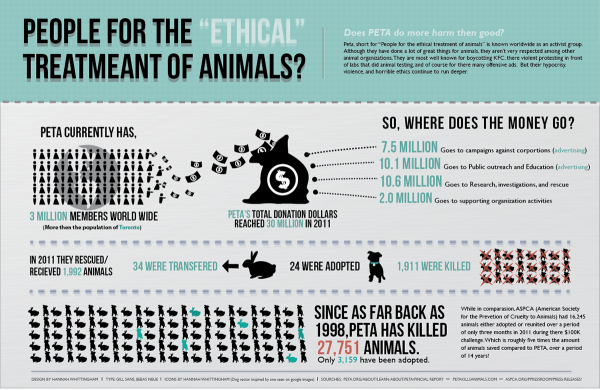
By Victor Ledbetter Jr.
I have always appreciated the act of veganism from a distance. While I’ll admit that I have no plans of becoming a vegan anytime soon, I have always disliked the methods in which farming companies gather meat from animals by utilizing slaughterhouses to keep swaths of them in very tiny spaces in very poor conditions, keeping up with an astronomical demand for meat.
Even though many people know how the meat industry works, they still won’t go vegan or even limit their meat intake. Mostly because vegans get a bad rep due to a loud minority of the vegan community on the internet, or the large amount of false medical facts caused by veganism.
I blame the non-profit organization People for the Ethical Treatment of Animals (PETA) not for “pushing” veganism, but for providing broken promises and pushing oddly bad campaigns, which have soured the act of becoming a vegan altogether.
PETA has been known for taking in pets into their clinics to try and house them at a later date, as the organization touts that animals have the same rights as people. But the company has not been able to keep their word, euthanizing up to 45,000 dogs, cats and other critters according to PETAkillsanimals.com.
The shelter took in a total of 2,886 animals last year, so a little simple math reveals a 74% death rate for animals entrusted to PETA’s care. Only about 3% of the animals surrendered to the organization were successfully adopted.
The fact that an organization like PETA can preach the word of animal rights and then turn around and do this is very concerning, especially with the reputation that they try to uphold.
Why can’t PETA give away the pets to other shelters, or hold events where people could get a dog, or cat for free, or something along those lines? It seems a little odd that PETA would not think of solutions to try to find better situations for the animals rather than euthanizing them.
The ability to try and build conversation to a movement via a public campaign is very important if done well, yet the campaigns that PETA has conducted have been very odd and proven to be controversial.
There are two that I want to point out, a 2011 exhibit “Glass Walls” that was in Washington D.C.’s National Mail, and the 2014 “Got Autism” campaign.
The former, as reported by Stephen C. Webster for “RAWSTORY”, featured a collection of lynched African Amercans, child laborers and Cambodian genicide victims among many others images. These images were used to draw a wide range of human suffering to try and make a point about animal suffering. According to Webster, PETA co-founder Ingrid Newkirk claimed that people who could not see the message were caught up in racism or their racial identity.
“There’s no one thing,” she said. “It’s all about the fact that human beings have an infinite ability to be kind, but they also have an infinite capacity to compartmentalize others, to be dismissive of others, to be prejudiced toward others. It’s what human beings do. This exhibit says open your heart, open your mind, open your eyes, and look at the act and say, ‘Do I want to be part of this or not?’”
While I recognize that animals can have emotion, and can go through pain and suffering, but I find it odd to compare animal suffering to human suffering as in genocide, lynching, and child labor among many other things.
To me, the exhibit felt very pretentious, like they were trying to say, “Animals have had it way worse than humans”. Why draw comparisons when all there was to do was to highlight the dark nature that animals in slaughterhouses go through?
The “Got Autism” campaign tried to link milk and other dairy products to autism, but the studies were debunked by Jeffrey Kluger from “Time Magazine” as he thought the research PETA conducted was too biased.
Kluger states that one study conducted in 2002 observed possible improvement in symptoms of autism when children were put in diets free of gluten, gliadin and casein, the proteins found in grains and dairy products, but Kluger slams the study for being dated, vague and biased.
“It’s vague—with the researchers broadly blaming the problem on ‘processes with opioid effect,’ whatever that means. It was also tiny—relying on a sample group of just 20 kids. Finally, the study was admittedly single-blind, which means that the experimenters knew which kids were getting the special diet and which weren’t.”
This campaign has to be the strangest of them all as there is no real proof that dairy products can cause autism, and as someone with an autistic little brother, I can tell you that is not how it works.
In fact, there are many people that could tell you the exact same thing. Nobody can obtain autism like the common cold or flu, it happens through birth, as the baby is developing in the womb. It is until a little while after birth where the signs of autism start to show up.
If autism could be caught like the cold, nobody would be drinking milk.
It’s sad, because I would love for people to be informed about the damage we are doing to the environment as a result of the farming methods on animals.
I want people to try to better themselves by trying to expand their diet to more vegan friendly options. But as long as PETA keeps shooting themselves in the foot, everybody loses.






